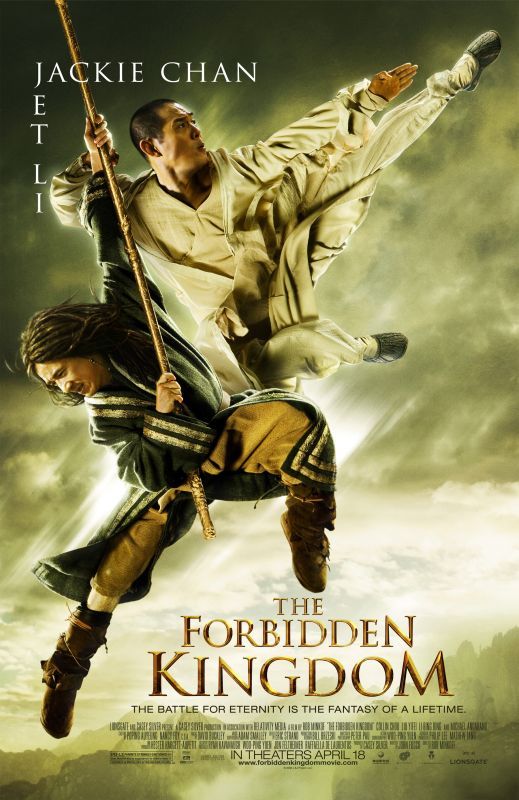Value of a Scalded Hand
By Anthony Casperson
2-22-25
On a whim, I recently rewatched 2008’s The Forbidden Kingdom. Honestly, I just felt like enjoying that Jackie Chan and Jet Li fight. But there’s a part of the film shortly afterwards that has left me sitting back and contemplating every time I’ve watched it.
In this subdued scene around a night’s fire, Jason—a young New York resident who had been transported to a mystical version of ancient China—and Jackie Chan’s character, named Lu Yan, talk about Jason being trained in kung fu. The young man has been shown to obsess over kung fu movies so much that he can spout out all sorts of style names. And thus, he asks Lu Yan which style he’ll be trained in.
Trust me, the list goes on for so long, it almost stops being funny.
At the same time, Lu Yan pours hot water into Jason’s cup so that he can have tea. But while the New Yorker has his head in the clouds dreaming of all the moves he’ll be able to do, the water just keeps pouring and pouring and pouring. It’s not until the hot water scalds Jason’s hand that he’s broken from his kung fu fantasies.
Obviously, Jason complains. But the martial arts master responds by saying that a filled cup cannot have anything poured into it. He then explains that it’s impossible to teach someone who believes themselves to be knowledgeable of the topic. Jason must put aside the things he “knows” about kung fu in order to actually learn.
The scalding water flowing out of a full cup was an object lesson. A painful one at that. And most of the subsequent training montage reveals much the same thing. The knowledge and understanding comes from difficult and painful lessons.
We find harsh lessons like this in a number of stories—especially martial arts movies like this. But when we see the mentor/master using such techniques, we understand that the methodology doesn’t come from a place of malice or degradation. No, the intent is to build up the one learning the lesson. To help them achieve their potential.
Yet, when it comes to the spiritual lives of followers of Jesus, we often just assume that any sort of discipline from God is because he’s a “big meanie in the sky who doesn’t want us to have any fun.” We see the harsh lesson as something wrong with God instead of something wrong with our preconceived notions for our own good.
All we see is scalding water tearing us away from our kung fu fantasies, instead of the first lesson.
I came across one of numerous examples for this concept during my morning devotionals this week. The life of Hosea was an object lesson in and of itself. And in the first two chapters we see God teach the Northern Kingdom of Israel about emptying their cups of idolatry so that he can fill it with his blessing.
The book bearing the prophet’s name begins with a call from God for Hosea to marry a prostitute. (Since God compares prostitution to idolatry—both of which he regards negatively in the passage—I will not refer to her as the politically correct term of “sex worker.”) Hosea 1:2 indicates that this was God’s very first message to the prophet. I know that if I were in the prophet’s position, I might want to double check if that’s what God’s voice sounds like.
Regardless of our feelings about the situation, Hosea marries a prostitute named Gomer. And the pair eventually have three children: Jezreel, Lo-ruhamah, and Lo-ammi. The younger two—a daughter and a son, respectively—have a direct translation from the Hebrew that the ESV states outright. But the eldest’s name might need a bit of explanation.
Jezreel was a city in ancient Israel that sat on a valley crossroad. Such prime real estate meant that it was often the location of battle. And in their recent history, Hosea’s primary audience had just witnessed a bloody battle and regime change in Jezreel.
So, Hosea was basically told by God to name his children: Bloody Battlefield, No Mercy, and Not My People. Lovely names, right?
God even has Hosea explain that Israel had been like the prostitute Gomer, going after other lovers (gods of the surrounding nations). Because of this blatant idolatry, there would be the punishment like a bloody battle coming where no mercy would be given because they’d refused to act like his people.
It all sounds harsh to us. And even if the people deserved such treatment because of their idolatry, it doesn’t seem to us to have any flavor of the grace we know of through Jesus.
But that’s only if we focus on the scalding water instead of the following lesson about the cup.
In Hosea 1:10-2:1, we witness the blessed glimpse of grace found in the word “Yet/But.” All of the previous words that seem terrible are what the people deserve, but there’s still a lesson to be learned. A call for return to right relationship, if only we empty our cups of what we think we know about spirituality.
If the idolaters return from their unfaithful ways, then they will be blessed like a mother of many children. In the very place where they’d been pronounced as “not God’s people,” they will be called the children of God. The bloody battle of Jezreel will be shown as a victory. They will be God’s people. And they’ll receive his mercy.
Each of the stated punishments will be removed and replaced with God’s blessing. All if they cease their idolatrous ways.
The rest of Hosea 2 repeats this idea. Verses 2-13 speak of Israel as a prostitute who goes off to her lovers, the place where she thinks that her needs and wants are met. But God—who’d actually been the place where those great blessings had been coming from—will remove his blessing from their lives. And when the abundance ceases to nothing, when the lovers are proven to be nothing but careless users, then Israel will realize the truth. Only after hitting rock bottom will they reach out to God once again. They’ll run home to their metaphorical husband.
And instead of rejection and hatred, they’ll find the true God with arms wide open. The rest of the chapter shows the good and the blessing that Yahweh will give when they remove the name of the Baals from their lips. Again, Jezreel will be a place of victorious abundance. And God will bestow mercy upon those who’d had no mercy. And those to whom God had said were not his people, he will say, “You are my people,” while they say to him, “You are my God.”
The lesson might seem harsh. But it’s not meant to tear down and destroy. Instead, the point of the lesson is to build up the people of Israel to become the people God called them to be.
And the same is true of every seemingly harsh lesson God has for us.
Sometimes the sharp, but quick, pang of scalding water is to get our head out of the clouds of our fantasies so that we can empty our cups of our own idolatries. Get rid of those things that sit on God’s throne in our lives. The repetitious sins. The bad habits that call out to lure us to other lovers. The actions that are less than godly.
Preferably, we should stay in line with the ways of God instead of having to deal with the harsh punishments. Stay faithful to the ways of God instead of cavorting around with careless users until the blessings dry up to nothing.
But even if we must learn the harsh lesson of a scalded hand, know that it is for our good. That we might learn the truth instead of holding on to those fantasies that give us nothing.
So, let’s empty our cups of idolatry so that God can fill them up with the blessings of victory, mercy, and the ability to be called the people of God.



